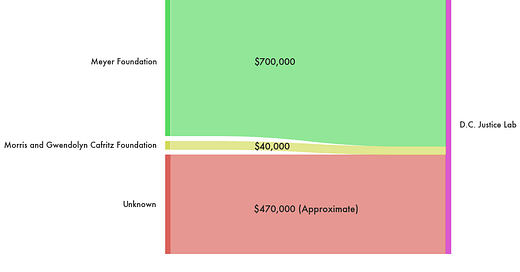Over the last year, legislation was presented to Washington, D.C.’s city council to overhaul the city’s criminal code. It was an exhaustive change that would affect dozens of statutes on criminal sentencing guidelines that go back over a hundred years.
The changes were presented as an attempt to update ancient rules to modern standards. According to a Washington Post story on the subject, it would replace maximum penalties on most crimes with a tiered system where sentences better fit the severity of the offense.
But the U.S. Congress, which has budgetary control over the city, rejected the criminal code overhaul in February. Critics of the changes said that it would lower the punishments for a variety of crimes and eliminate minimum sentencing right when the district was experiencing a resurgence in crime. Allowing jury trials for all misdemeanors had the potential to overload the court system, while supporters of the bill believed that jury trials should be an option in serious misdemeanors.
In an analysis of the changes, the U.S. Attorney’s Office for D.C., which operates under the Department of Justice, agreed with some changes but disagreed with others, like the elimination of accomplice to murder as a charge.
Along the way, it was revealed that the bill was largely crafted by an independent nonprofit organization: the D.C. Justice Lab. Patrice Sulton, executive director for D.C. Justice Lab, was the Senior Attorney Advisor to the city’s Criminal Code Reform Commission that headed up the revisions. They, along with FWD.US—a nonprofit advocacy organization funded substantially by Facebook’s founder, Mark Zuckerberg—promoted the revisions. In IRS filings, the organization describes their involvement as “a leading role in preparing witnesses to testify” on the criminal code revision effort. While substantially involved in the process, Sulton’s name does not appear on the website for the Criminal Code Reform Commission, now or in the past.
The legal non-profit doesn’t detail who their funders are, but some of their funders have detailed their grants to the nonprofit in Internal Revenue Service (IRS) statements, while others detail their grants online in press releases.
Their largest donor around the time of the Criminal Code revamp is the Eugene and Agnes E. Meyer Foundation, donating $700,000 in 2021 according to data from Candid—around 3/4th of D.C. Justice Lab’s annual revenue.
The foundation was started in 1944 by Agnes Meyer, a journalist turned philanthropist, and her husband, Eugene Meyer, a financier who owned the Washington Post in the late thirties and was the founding president of the World Bank. Their daughter, Katherine Graham, would take over control of the Post and run it for almost thirty years.
Other donors with known donation amounts include Morris and Gwendolyn Cafritz Foundation ($40,000), Herb Block Foundation ($10,000), and The Barr Fund ($500).
Donors where the amounts are not known or not confirmed in data include Charles and Lynn Schusterman Family Foundation, the England Family Foundation, Humanity United, the If Foundation, and Liberated Capital of the Decolonizing Wealth Project. Like D.C. Justice Lab, a number of these foundations focus on racial justice. For example, Liberated Capital funds efforts toward a “reparations summer.”




I'm a DC resident and no fan of the revised criminal code, but I don't think it's accurate to say "was largely crafted by an independent nonprofit organization: the D.C. Justice Lab." Where does it say that in any of the links?
You state "Sulton’s name does not appear on the website for the Criminal Code Reform Commission, now or in the past." That is factually incorrect. Sulton is listed in the meeting minutes as an employee of the Commission starting AT LEAST as early as April 2018 and those minutes are available on the CCRC's website at: https://ccrc.dc.gov/node/1201597. In addition, Sulton is described as having left employment at the CCRC in the 1/6/21 meeting minutes (https://ccrc.dc.gov/sites/default/files/dc/sites/ccrc/publication/attachments/1-6-21-Meeting-Minutes.pdf).
Furthermore, there is a group of voting people on the Committee and they're listed on the CCRC's website. If the revised code really was drafted principally by DC Justice Lab (which is far from established and directly contrary to contemporary reporting) where's the accountability for those who were formally appointed to the Commission, who voted in favor of the Draft, and pushed it forward to the Council? Notably, the voting members included a rep from the USAO, who voted yes to advance the CCRC's final recommendations.
It was absolutely a clusterfuck and obviously ill-advised for the USAO rep on the CCRC to vote yes for a set of recommendations they ultimately did not want to see enacted into law. But what does DC Justice Lab have to do with that? And where were the Council members?? Oh right, voting in favor of the CCRC-backed amendments and then ALSO OVERRULING THE MAYOR'S VETO.
Overall -- very, very thin.